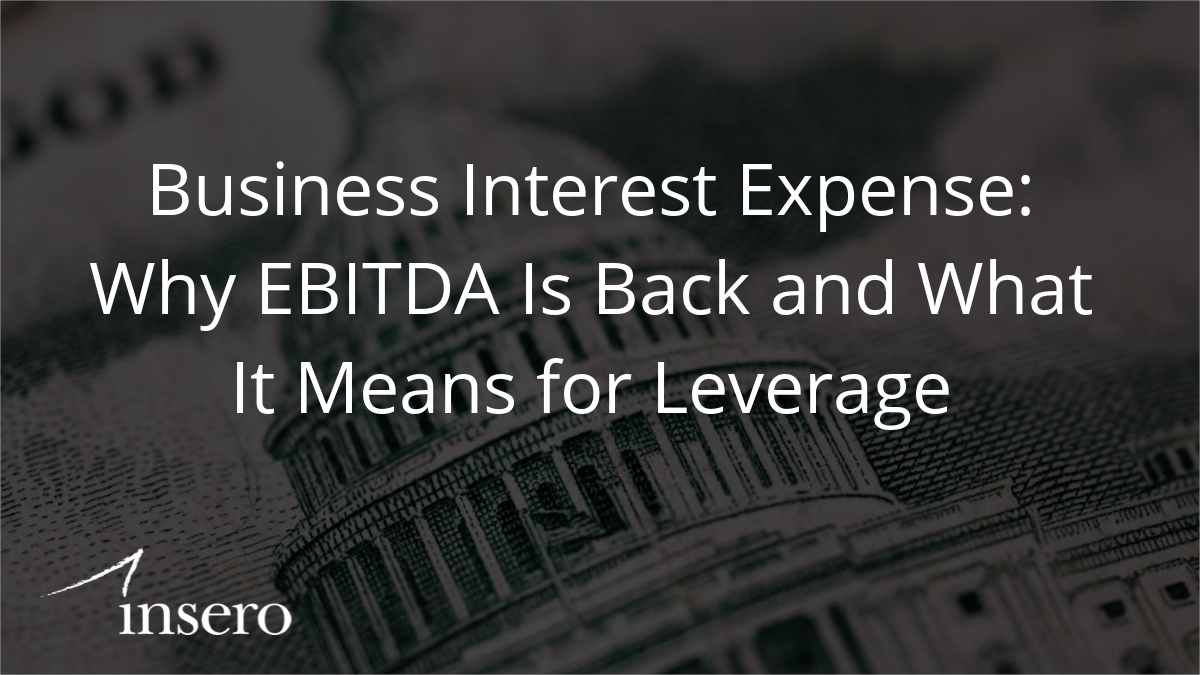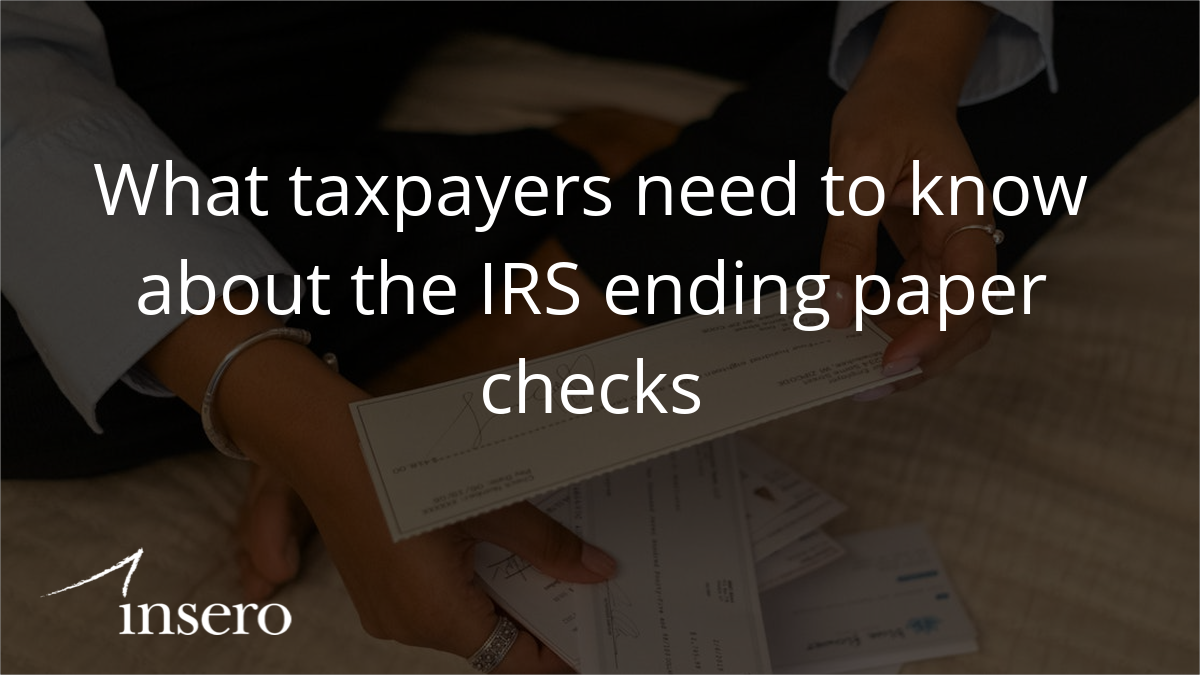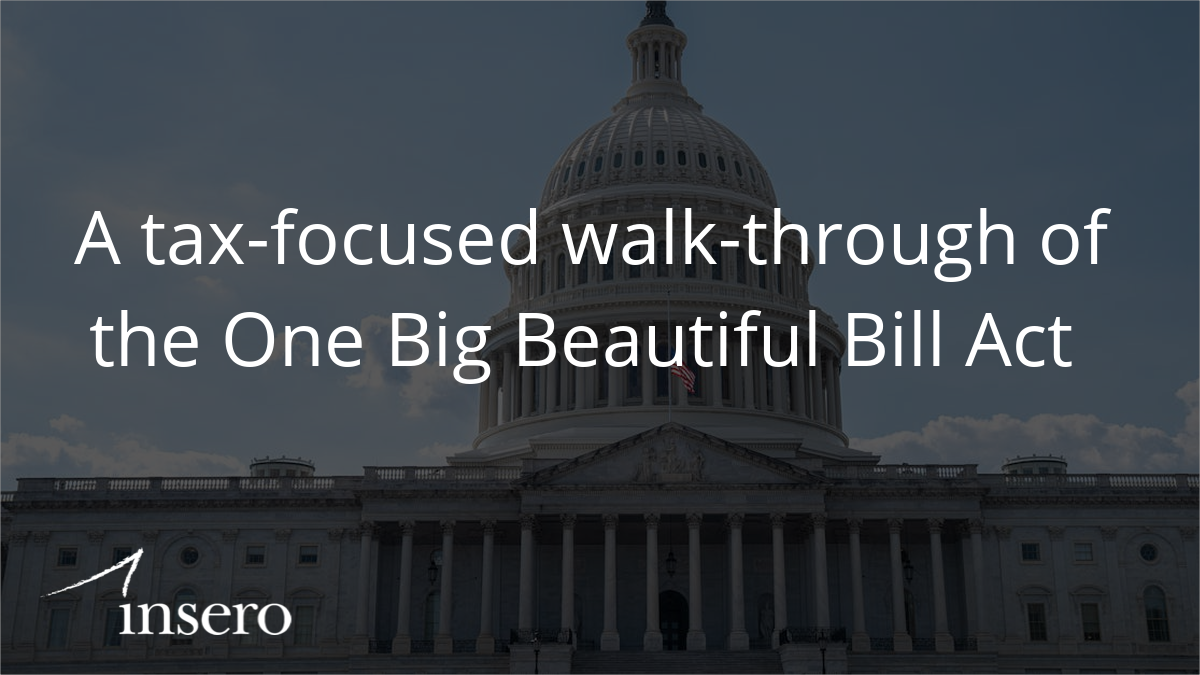ARTICLE | May 19, 2025
Executive summary
Republicans in the U.S. House of Representatives are considering tax legislation that would affect employers and employees from a compensation and benefits perspective.
Key proposed changes in the House tax bill include:
- Expanding and making permanent certain employer tax credits and other provisions from the Tax Cuts and Jobs Act (TCJA) and the Coronavirus Aid, Relief, and Economic Security Act (CARES Act).
- Exempting tips and overtime pay from federal income tax retroactive to Jan. 1, 2025, through 2028, which could create administrative burdens for employers who may need to adjust payroll systems and withholding procedures.
- Broadening the scope of section 162(m), extending the $1 million deduction limit to controlled groups.
Republican tax bill would affect tax treatment of certain compensation and benefits arrangements
The Ways and Means Committee of the U.S. House of Representatives on May 12 released a 389-page draft of highly anticipated tax legislation, part of a broad taxation-and-spending package Republicans have dubbed The One Big Beautiful Bill Act.
The proposed legislation, which is subject to change during the budget reconciliation process, includes the following provisions that would affect compensation and benefits arrangements.
No federal income taxes on tips and overtime
Effective for tax years 2025 through 2028, individuals would be able to exclude qualified tips from gross income for federal income tax purposes. The exclusion would be taken by the individual as an above-the-line deduction on Form 1040 for cash tips received in an occupation that customarily receives tips (as identified by the Secretary of the Treasury within 90 days of the effective date of the provision).
Individuals would be able to only deduct tips that are reported on certain information returns, such as, for example, a Form W-2 or Form 1099-NEC. Amounts received by certain professional service businesses would not be qualified tips.
Highly compensated employees (generally, individuals that made more than $155,000 (indexed) as employees in 2024) would not be entitled to the deduction. Tips would still be considered wages for Federal Insurance Contribution Act (FICA) purposes.
In addition, the tax credit available to certain employers in the food and beverage industry that offsets the employer portion of FICA taxes paid on tips would be expanded to include certain beauty services businesses.
Effective for tax years 2025 through 2028, qualified overtime compensation (i.e., overtime required to be paid under the Federal Labor Standards Act) would be excluded from gross income for federal income tax purposes. The exclusion would be taken by the individual as an above-the-line deduction on Form 1040. Overtime wages would still be subject to FICA.
Highly compensated employees would not be entitled to the deduction. Overtime would have to be reported on Form W-2 to be excludible from gross income.
Washington National Tax insight: The employer deduction withholding tables for federal income tax would need to be modified. Given a retroactive effective date and changes to employer withholding and reporting, employers would need to react quickly to these provisions if they remain in final legislation.
Expansion of section 162(m) to controlled groups
Effective for taxable years beginning after 2025, in the case of a publicly held corporation that is a member of a controlled group (as defined in the qualified plan rules), all members of the controlled group would be considered for purposes of the deduction disallowance under section 162(m).
Payments to a “specified covered employee” made by any member of the controlled group would be aggregated, and, to the extent the aggregate amount exceeds $1 million, the deduction limitation would be allocated out to each member of the controlled group based on the percentage that bears the same ratio as compensation paid by that member to aggregate compensation paid to all members.
A specified covered employee with respect to the controlled group would mean the principal executive officer, principal financial officer, the three highest compensated officers for the year, and any “once covered, always covered” officers of the publicly held corporation (that is, any individual who has been identified as one of the covered employees in any year since 2017).
In addition, for taxable years beginning after 2026, a specified covered employee would also include any employee who is among the five highest compensated employees for the taxable year, taking into account all members of the controlled group. This is based on the expanded definition of covered employee under section 162(m) as amended by the American Rescue Plan Act (ARPA), that includes up to five additional non-officers that make over $1 million in a given year, starting after 2026.
Washington National Tax insight: Current section 162(m) provides similar rules for allocating the deduction limitation for affiliated groups as are proposed for controlled groups. Changes to section 162(m) under the ARPA will be effective beginning in 2027. Taxpayers asked Treasury and the IRS to issue rules implementing the ARPA changes in advance of the effective date in order to address potential impacts, and proposed rules were recently published.
The House proposal extends section 162(m) to an entirely new related group of entities and may require additional rules, potentially delaying finalization of the issued proposed rules.
Importantly, the proposal would change the section 162(m) rules such that individuals employed by an unincorporated trade or business under common control with the publicly held corporation could be covered employees. This could include partnerships or affiliated service groups, such as certain service organizations connected through ownership or management.
As a result, certain entities in controlled group structures (such as Up-C or REIT) may have to analyze whether section 162(m) would limit deductions.
TCJA temporary provisions made permanent
- Qualified bicycle commuting: The current suspension of tax-free treatment of qualified bicycle commuting reimbursements would become permanent.
- Moving expenses: The current suspension of tax-free treatment of employer-paid qualified moving expenses would become permanent (i.e., no future tax-free treatment for employer-paid moves), except in the case of certain members of the military. The current suspension of individual tax deductions for moving expenses in connection with employment would also become permanent.
- Employer credit for paid family and medical leave: The paid family and medical leave credit would be made permanent. Beginning in 2026, the credit would be available for paid leave insurance premiums in addition to certain wages paid. Controlled group employers would be treated as a single employer. Availability of the credit would be expanded to employers in all states and the minimum work requirement for employees to qualify would be reduced.
- Miscellaneous itemized deductions: The proposal would permanently eliminate individual miscellaneous itemized deductions, which were suspended through 2025 by TCJA. Before TCJA, expenses related to providing services as an employee were allowable miscellaneous itemized deductions.
Educational assistance programs
Employers can pay certain educational expenses on behalf of employees and exclude up to $5,250 from income. Under the CARES Act, excludible educational expenses were expanded to include the employer’s payment of qualified education loans through 2025. The proposed bill would make this expansion permanent and would index the current limit of $5,250 for inflation for future years.
Health savings accounts (HSAs)
The proposed bill would make several enhancements to HSAs regarding eligibility, contributions and distributions starting in 2026:
- Eligibility: Currently, HSA contribution eligibility requires coverage under a high-deductible health plan with no disqualifying coverage. The proposal would expand eligibility to include:
- Persons over age 65 entitled to Medicare Part A
- Enrollees in direct primary care service arrangements
- Enrollees in bronze or catastrophic health insurance plans through the Exchange
- Individuals with a spouse enrolled in a health flexible spending arrangement (FSA)
- Individuals obtaining qualified items and services through a health clinic at their worksite
- Contributions: For 2025, HSA limits are $4,300 (self-only) and $8,550 (family). The proposed bill would raise these by $4,300 and $8,550, respectively, with income caps ($75,000 for a single person, $150,000 for a family). Spouses who are both age 55 or over could combine catch-up contributions into one HSA. The revised law would also allow certain individuals to transfer health reimbursement arrangement (HRA) and health FSA balances to an HSA, subject to an annual dollar cap.
- Distributions: The proposed bill would allow tax-free distributions for direct primary care arrangements (up to $150/month individual; $300/month family), indexed for inflation. In addition, certain sports and fitness expenses, such as gym memberships and other amounts paid for participation or instruction in physical exercise or activity, would be HSA-eligible expenses (up to $500 per year for an individual; $1,000 per year for a family, with monthly caps). Furthermore, medical expenses incurred within 60 days after enrollment in a high-deductible health plan but before establishing an HSA would be qualifying medical expenses for HSA purposes.
Health reimbursement arrangements
The proposed bill would revamp individual coverage health reimbursement arrangements (ICHRAs) as “custom health option and individual care expense” (CHOICE) arrangements beginning in 2026.
The proposed bill would allow employees enrolled in a CHOICE arrangement to use pretax salary reductions under a cafeteria plan to buy Exchange coverage. Employers would be required to report the CHOICE amounts on Form W-2. Small businesses (less than 50 full-time employees) that establish a CHOICE arrangement could receive a two-year tax credit of $100 per month per enrolled employee ($50 per month in the second year).
Premium tax credits on health insurance
The proposed bill would tighten the rules regarding premium tax credits on health insurance purchased through the Exchange. Premium tax credits would be disallowed for individuals lacking annual eligibility verification, and for certain lower-income individuals enrolling during special enrollment periods. In addition, if individuals receive more premium tax credits than they are entitled to, they would be required to reimburse the IRS the full amount of the excess credit.
Provisions affecting exempt organizations
- Qualified parking expenses would be unrelated business income.
- The definition of covered employee for the excess compensation excise tax is expanded.
Learn more about these and other proposed tax changes affecting exempt organizations.
Takeaways
If enacted, the proposed bill may require employers to evaluate and adapt their compensation and benefits programs and administrative practices.
The retroactivity of exclusions for tips and overtime to the beginning of 2025 may require quick payroll adjustments, new systems for reporting and employee education to avoid compliance issues.
Expanding section 162(m) to controlled groups means publicly held corporations with related entities may want to reevaluate executive pay structures to avoid lost deductions. The permanency of certain TCJA and COVID-era changes present both opportunities and challenges for employers that leverage tax-free benefits to attract and retain talent.
Let’s Talk
Fill out the form below and we’ll get back to you to discuss your specific situation.
This article was written by Amber Salotto, Karen Field , Anne Bushman, Jill Harris and originally appeared on 2025-05-19. Reprinted with permission from RSM US LLP.
© 2024 RSM US LLP. All rights reserved. https://rsmus.com/insights/tax-alerts/2025/house-tax-bill-tax-treatment-compensation-benefits-arrangements.html
RSM US LLP is a limited liability partnership and the U.S. member firm of RSM International, a global network of independent assurance, tax and consulting firms. The member firms of RSM International collaborate to provide services to global clients, but are separate and distinct legal entities that cannot obligate each other. Each member firm is responsible only for its own acts and omissions, and not those of any other party. Visit rsmus.com/about for more information regarding RSM US LLP and RSM International.
The information contained herein is general in nature and based on authorities that are subject to change. RSM US LLP guarantees neither the accuracy nor completeness of any information and is not responsible for any errors or omissions, or for results obtained by others as a result of reliance upon such information. RSM US LLP assumes no obligation to inform the reader of any changes in tax laws or other factors that could affect information contained herein. This publication does not, and is not intended to, provide legal, tax or accounting advice, and readers should consult their tax advisors concerning the application of tax laws to their particular situations. This analysis is not tax advice and is not intended or written to be used, and cannot be used, for purposes of avoiding tax penalties that may be imposed on any taxpayer.




